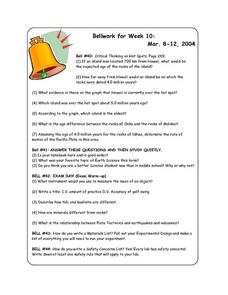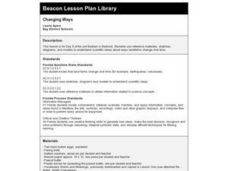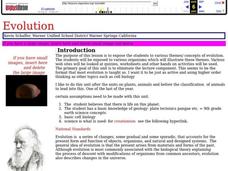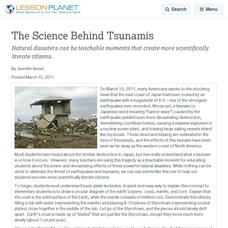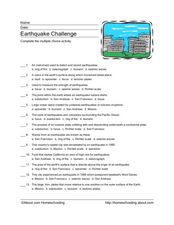Curated OER
Bellwork for Week 10
In this bellwork worksheet, students answer questions about the Hawaiian islands formation, about science class in general, about rocks and minerals and about experimental design.
Curated OER
Changing Ways
Third graders examine hard boiled eggs as possible models for the earth's layers.
Curated OER
Volcanoes: Fourth Grade Lesson Plans and Activities
Young geologists begin exploring volcanoes of different structures and states: active, extinct, or dormant. During the lab, they make three models and compare different types of volcanoes, including composite, cinder cone, and shield....
Curated OER
Volcanoes: Second Grade Lesson Plans and Activities
Young geologists explore volcanoes with a series of engaging geology activities. First, they learn the difference between magma and lava before coloring and labeling the parts of a volcano. During the lab, individuals watch a...
Curated OER
Volcanoes: Third Grade Lessons Plans and Activities
Discover how rocks are formed from volcanoes during a geology pre-lab activity. Third graders describe the volcanic rock samples and creating a model of Mt. Lassen, located in California. The lesson culminates in a discussion about how...
Curated OER
Hazards: Second Grade Lesson Plans and Activities
Equip learners with safety knowledge in the case of an earthquake. After coloring the places to go to get help after a quake, and label places that wouldn't be safe to go after a quake, young geologists simulate three levels of...
Mr. E. Science
Volcanoes
What is the difference between a shield volcano and a cinder cone volcano? How does the flow of lava influence the type of rock that's formed? A presentation on different aspects of volcanoes answers these questions for middle school...
Curated OER
Hazards: Fourth Grade Lesson Plans and Activities
Learn about damage associated with earthquakes and materials that best withstand a quake. A lab engages class members in the experimental design and construction of sturdy structures that can endure various earthquake intensities. Groups...
Curated OER
Earthquakes: Fifth Grade Lesson Plans and Activities
After learning about P waves and S waves, fifth graders view the intensity of earthquakes by examining seismographs and images of earthquake damage. Young scientists then forecasting future quakes by analyzing data about earthquakes...
Curated OER
Hazards: Third Grade Lesson Plans and Activities
Learners discover hazards related to volcanoes and predict the effects these hazards have on people and land. As blossoming geologists explore various volcanic eruptions, including the hazards associated with them, they create their own...
Curated OER
Building for the Big One
Students build and test structures that can best withstand earthquakes. They create their structures from playdough, cornstarch, grape-nuts and popsicle sticks and place their structures on a "shake table."
Curated OER
Earthquakes: Fourth Grade Lesson Plans and Activities
Examine earthquake intensities and ways to measure an earthquake through the comparison of the Mercalli and Richter scales. After completing the pre-lab worksheet, fourth graders compare high and low intensity quakes by testing the...
Teach Engineering
Earthquakes Living Lab: Designing for Disaster
Build and design to rock and roll. Pairs research building design in earthquake areas and use computer simulations to see the effects of earthquakes on buildings,. They then sketch and explain a building design that would withstand a...
NOAA
Ocean Geologic Features
Sediment samples from the ocean bottoms tell scientists about climate change, pollution, and changes in erosion for the area. Groups of learners focus on sediments and their movement through water. During a hands-on activity, they...
Curated OER
Evolution
Explore the concept of evolution and cell biology; your class can work in groups to use the internet to view websites on evolution, take a quiz, and complete a lab activity.
Curated OER
Volcano Live
Pupils discover the inevitable threat of volcanoes as they identify the ring of fire. In this natural disasters lesson, students examine the tectonic plate theory and discuss how magma works it's way to the surface of the Earth. Pupils...
Curated OER
How Deep is the Ocean
Students predict and then analyze the layout of the tectonic plates that form the ocean's floor using mapping skills and Inquiry based problem solving, They compare the depth of various regions in the ocean with the geologic age to...
Curated OER
The Science Behind Tsunamis
Natural disasters can be teachable moments that create more scientifically literate citizens.
Curated OER
Building a Better Sentence
Sentence construction is both a science and an art. This bare bones lesson ties an analysis of earth's geology to sentence formation. Although referenced as a major part of the activity, there are no links to the technology or resources...
Curated OER
Geology Rocks
Middle schoolers discuss information relating to Illinois geology. They examine top mineral resources in Illinois to find detailed information about geodes and where they can be found. Students complete geode lab to explore external...
Curated OER
Amazing Planet DVD-Video Assignment
In this geography skills learning exercise, students watch the National Geographic video "Amazing Planet." Students then respond to 13 short answer questions about the content of the video.
Curated OER
Magnetometer Extension Activities
Learners observe magnetic fields and locate the position of "ore deposits" patterns using models and maps. In this magnetometer lesson students complete a hands on activity and a reading/writing exercise.
Curated OER
Earthquake Challenge
In this earthquake facts review or quiz worksheet, students read descriptive statements and choose the correct multiple choice answer. Students write 13 answers.
Curated OER
Plotting Earthquakes
Learners plot earthquakes on a map. In this lesson on earthquakes, students will explore recent earthquake activity in California and Nevada. Learners will plot fault lines and earthquake occurrences on a map.


